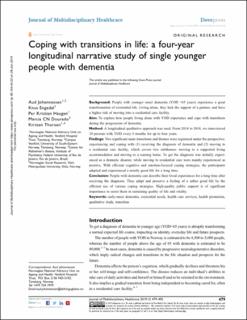| dc.contributor.author | Johannessen, Aud | |
| dc.contributor.author | Engedal, Knut | |
| dc.contributor.author | Haugen, Per Kristian | |
| dc.contributor.author | Dourado, Marcia Cristina Nascimento | |
| dc.contributor.author | Thorsen, Kirsten | |
| dc.date.accessioned | 2020-03-13T13:51:43Z | |
| dc.date.available | 2020-03-13T13:51:43Z | |
| dc.date.created | 2019-07-03T16:53:54Z | |
| dc.date.issued | 2019 | |
| dc.identifier.citation | Journal of Multidisciplinary Healthcare. 2019, 12 479-492. | en_US |
| dc.identifier.issn | 1178-2390 | |
| dc.identifier.uri | https://hdl.handle.net/11250/2646777 | |
| dc.description | This work is published and licensed by Dove Medical Press Limited. The full terms of this and incorporate the Creative Commons Attribution – Non Commercial | en_US |
| dc.description.abstract | Background: People with younger onset dementia (YOD <65 years) experience a great transformation of existential life. Living alone, they lack the support of a partner, and have a higher risk of moving into a residential care facility. Aim: To explore how people living alone with YOD experience and cope with transitions during the progression of dementia. Method: A longitudinal qualitative approach was used. From 2014 to 2018, we interviewed 10 persons with YOD every 6 months for up to four years. Findings: Two significant main transitions and themes were registered under the perspective; experiencing and coping with (1) receiving the diagnosis of dementia and (2) moving to a residential care facility, which covers two subthemes: moving to a supported living accommodation and moving to a nursing home. To get the diagnosis was initially experienced as a dramatic disaster, while moving to residential care were mainly experienced as positive. With efficient cognitive and emotion-focused coping strategies, the participants adapted and experienced a mostly good life for a long time. Conclusion: People with dementia can describe their lived experiences for a long time after receiving the diagnosis. They adapt and preserve a feeling of a rather good life by the efficient use of various coping strategies. High-quality public support is of significant importance to assist them in sustaining quality of life and vitality. | en_US |
| dc.language.iso | eng | en_US |
| dc.rights | Navngivelse-Ikkekommersiell 4.0 Internasjonal | * |
| dc.rights.uri | http://creativecommons.org/licenses/by-nc/4.0/deed.no | * |
| dc.title | Coping with transitions in life: a four-year longitudinal narrative study of single younger people with dementia | en_US |
| dc.type | Peer reviewed | en_US |
| dc.type | Journal article | en_US |
| dc.description.version | publishedVersion | en_US |
| dc.rights.holder | © 2019 Johannessen et al. | en_US |
| dc.source.pagenumber | 479-492 | en_US |
| dc.source.volume | 12 | en_US |
| dc.source.journal | Journal of Multidisciplinary Healthcare | en_US |
| dc.identifier.doi | 10.2147/JMDH.S208424 | |
| dc.identifier.cristin | 1709914 | |
| cristin.ispublished | true | |
| cristin.fulltext | original | |
| cristin.qualitycode | 1 | |

